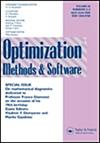A simple algebraic proof of Farkas's lemma and related theorems
IF 1.4
3区 数学
Q3 COMPUTER SCIENCE, SOFTWARE ENGINEERING
引用次数: 33
Abstract
A proof is given of Farkas's lemma based on a new theorem pertaining to orthogodal matrices. It is claimed that this theorem is slightly more general than Tucker's theorem, which concerns skew-symmetric matrices and which may itself be derived simply from tne new theorem. Farkas's lemma and other theorems of the alternative then follow trivially from Tucker's theorem法卡斯引理及相关定理的简单代数证明
基于正交矩阵的一个新定理,给出了法卡斯引理的证明。有人声称,这个定理比塔克定理稍微更普遍,塔克定理是关于斜对称矩阵的,它本身可以简单地从这个新定理中推导出来。法卡斯引理和其他可选定理则是简单地从塔克定理推导出来的
本文章由计算机程序翻译,如有差异,请以英文原文为准。
求助全文
约1分钟内获得全文
求助全文
来源期刊

Optimization Methods & Software
工程技术-计算机:软件工程
CiteScore
4.50
自引率
0.00%
发文量
40
审稿时长
7 months
期刊介绍:
Optimization Methods and Software
publishes refereed papers on the latest developments in the theory and realization of optimization methods, with particular emphasis on the interface between software development and algorithm design.
Topics include:
Theory, implementation and performance evaluation of algorithms and computer codes for linear, nonlinear, discrete, stochastic optimization and optimal control. This includes in particular conic, semi-definite, mixed integer, network, non-smooth, multi-objective and global optimization by deterministic or nondeterministic algorithms.
Algorithms and software for complementarity, variational inequalities and equilibrium problems, and also for solving inverse problems, systems of nonlinear equations and the numerical study of parameter dependent operators.
Various aspects of efficient and user-friendly implementations: e.g. automatic differentiation, massively parallel optimization, distributed computing, on-line algorithms, error sensitivity and validity analysis, problem scaling, stopping criteria and symbolic numeric interfaces.
Theoretical studies with clear potential for applications and successful applications of specially adapted optimization methods and software to fields like engineering, machine learning, data mining, economics, finance, biology, or medicine. These submissions should not consist solely of the straightforward use of standard optimization techniques.
 求助内容:
求助内容: 应助结果提醒方式:
应助结果提醒方式:


